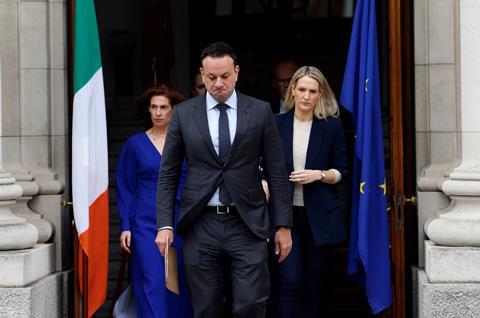The Irish people have voted to keep marriage as the legal foundation for families and society. Christians should draw encouragement from this, says the Evangelical Alliance’s Nick Park

Journalists and politicians alike were caught by surprise at the news the Taoiseach (Prime Minister) of Ireland has resigned.
Following a defeat for the government in a double referendum on constitutional changes, Leo Varadkar declared that he was no longer the best person to ensure the government’s re-election.
The first referendum proposed changing the pivotal role of marriage as the foundation for family and society. The idea was to replace marriage with “durable relationships” (whatever that means).
The second referendum sought to remove a reference to “mothers” not being obliged by economic necessity to neglect their responsibilities in the home. Many of us had suggested that it could be less archaic or patronising to simply add the word “fathers” as well. Instead, the government came up with a word salad that basically said families are good for caring for people.
The coalition government, along with all the major opposition parties, had supported the campaign for a ‘Yes’ vote in the referendums. Public money was poured into the campaign. So, why were they all defeated?
In the end, people voted ‘No’ for a variety of reasons. Christians wanted to retain the central role of marriage. Carers and those with disabled relatives felt the government was trying to evade its responsibility for providing care and support. The far right argued that it was all a smoke screen to bring in more immigrants or to promote transgenderism. Other people were unhappy about the government’s failures to tackle a housing crisis, or to improve waiting lists in the health service. The referendum provided an opportunity to express their anger.
What was obvious was that politicians, media and opinion polls failed to predict the overwhelming rejection of the referendum proposals. Those in power were obviously out of touch, and Leo Varadkar, as the man at the top, took the blame.
So where does this leave Irish Christians? Certainly we can draw much encouragement from the fact that the Irish people, by a two-thirds majority, have voted to keep marriage as the legal foundation for families and for society in general.
Christians, more than anyone else in the world, understand why marriage is so special
The pace of change in Ireland has been bewildering for many, and it has all seemed to be heading in one direction. A traditional society has jumped headlong into post-modernism without bothering with modernism at all. The Catholic Church’s moral majority has been in freefall. Scandals have battered the Church’s reputation.
Recent referendums have legalised same-sex marriage and abortion. An increasing number of children are born out of wedlock. The perception was that secularism had permanently replaced faith. Ireland was held up as a poster child for a post-Christian society.
Many of us have long contended that the reality was more complex. The traditional churches have indeed been in decline. Nominal religion is no longer a requirement for full participation in Irish society. But convictional religion has been growing steadily. Evangelical churches are springing up all over Ireland, often meeting in industrial units, community centres, and even cinemas.
Only a few years ago, most Irish people saw Evangelical Christianity as something that happened somewhere else – notably in the United States. Born-again believers were viewed as small groups of strange people on the fringes of Irish society. But the Church has emerged from the shadows, and now most people have at least some friends or family who are connected with growing multicultural and multigenerational churches with a renewed confidence to engage their faith with the broader community.
Of course there were many reasons why people voted against the government’s latest proposals to update the Constitution. But the special position still occupied by marriage should challenge believers to live out our faith in our homes. This is not about fighting culture wars, or seeking political power. We know that Christians, more than anyone else in the world, understand why marriage is so special. We know that it was created by God. We know that two people become one flesh in the sight of God. And, when we truly practice Christian marriage the way God intended it to be, we can help those around us to appreciate just why they voted for marriage to still be acknowledged as the best possible foundation for families and for wider society.


































No comments yet